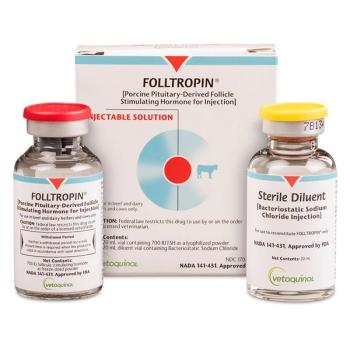
Feeding a pet's microbiome

Vicky Ograin, MBA, RVT, VTS (Nutrition), discussed the gastrointestinal microbiome and how it can be modulated with prebiotics, probiotics and postbiotics.
Microorganisms such as bacteria, fungi, viruses, archaea and protozoa, have a critical role in the health of animals. In a lecture at the 2025 Fetch dvm360 Conference in Nashville, Tennessee, Vicky Ograin, MBA, RVT, VTS (Nutrition), scientific communication senior specialist with Hill's Pet Nutrition, discussed the gastrointestinal microbiome and how it can be modulated with prebiotics, probiotics and postbiotics.1
“Prebiotics are dietary fibers that feed beneficial gut bacteria, enhancing microbial diversity. Probiotics are beneficial microorganisms introduced into the body to restore microbial balance, support immune health, and improve gut integrity. Postbiotics are metabolites like short-chain fatty acids (SCFAs) and polyphenols produced by gut bacteria during fermentation of dietary fibers,” Ograin noted in her presentation.1
Karen Shenoy, DVM, vice president and chief veterinarian for Hill’s EMEA at Hill’s Pet Nutrition, noted that the microbiome is a collection of microbes and all kinds of different organisms that are throughout our body, in
“We talk the most about the gut microbiome, and you hear about how what's in your gut and how the different microorganisms that live there can affect you system-wide. It can affect all kinds of different organ systems, and is really important in health and disease that we're thinking about keeping the gut microbiome, not just ourselves, but our microbes that live within us and within our pets good and healthy,” Shenoy said.2
As an example of how the gut’s microbiome can affect health, Ograin shared with Fetch attendees the story of her cat, Slick. “I adopted a kitten, and in about a year and a half of age, he was diagnosed with glomerulonephritis,” Ograin said.
A renal condition, glomerulonephritis is inflammation of the glomeruli, microscopic structures in the kidney that filter out toxins such as waste products. Although there are medication therapies, management of the disease may also include special diets and omega-3 fatty acid supplementation.3
In the case of Slick, Ograin explained, the kitten was initially given a prognosis of about 2 months to live. However, she inquired with Slick’s veterinary team about the possibility of using nutrition to help manage the disease and a diet that promoted renal health was suggested. Slick was put on a kidney diet combined with medications and subcutaneous fluids.1
“I caught it really early, but he was stage 4 renal disease when he was diagnosed, and he lived 10 years. In the end, he pretty much was just on the kidney diet and subcutaneous fluids. And so hopefully that shows you the power of nutrition,” Ograin said.1
Ograin explained the prebiotics are fibers that “feed” the gut’s microorganisms and equated them to “beneficial bacteria.” They produce SCFAs such as butyrate and are a source of polyphenois provide nutrients to the microbiome. In short, “prebiotics are probably one of the most important things that we can make sure that our dogs and cats, and us, are taking in to our body, so it helps with the microbial diversity,” she said.1
Although research is needed to further ascertain the benefits of probiotics for felines and canines, Ograin said, their efficacy has been linked to the unique conditions of each host. Therefore, not all probiotics will have the same effects on every host or every species.1
“So you've got the intestinal lining, and when you take in a probiotic, the goal of that beneficial bacteria is to adhere to the lining of the intestinal tract and to colonize, make more beneficial bacteria, because that's really where you're going to recolonize and get that population of bacteria back up again,” Ograin said.1
Lastly, postbiotics are the metabolites produced by bacteria during fermentation, according to Ograin. They include SCFAs and polyphenols. “Postbiotics are believed to contribute to the health benefits offering support for gut health, antioxidant, anti-inflammatory effects or even potentially be selectively antimicrobial. In other words they spare the good bugs and selectively limit the pathogenic ones,” Ograin said.1
In conclusion, imbalance of the microbiome can contribute to various health conditions. Although further research is needed, prebiotics, probiotics and postbiotics are all beneficial to the gut microbiome and support gastrointestinal health.1
“There's so much more that we need to learn, so we are just starting to really get the tip of the iceberg of all the things that the microbiome is associated with. It really affects every part of our body,” Ograin said.1
References
- Ograin V. The microbiome: a dynamic ecosystem. Presented at: Fetch dvm360 Conference; May 30-31, 2025. Nashville, Tennessee.
- Shenoy K, Crossley KC. What the microbiome means for pet health. dvm360. February 4, 2025. Accessed May 30, 2025.
https://www.dvm360.com/view/what-the-microbiome-means-for-pet-health - Williams K, Ward E, Panning A. Glomerulonephritis in cats. VCA Animal Hospitals. 2022. Accessed May 30, 2025.
Newsletter
From exam room tips to practice management insights, get trusted veterinary news delivered straight to your inbox—subscribe to dvm360.






